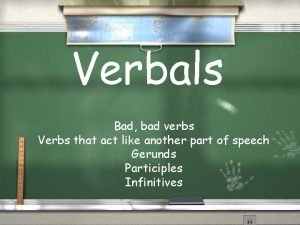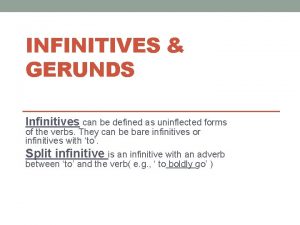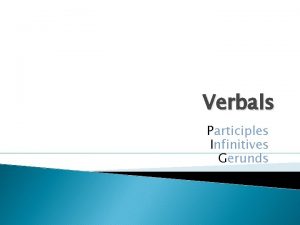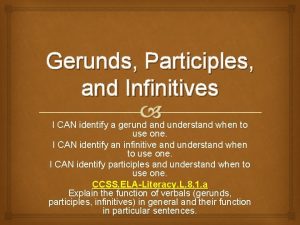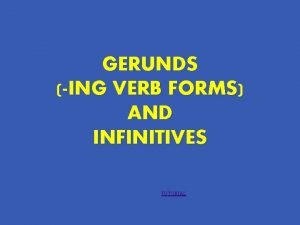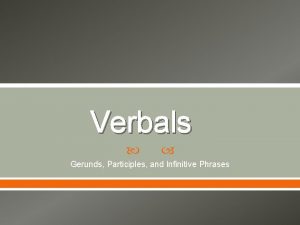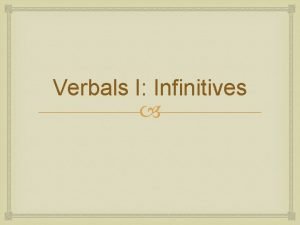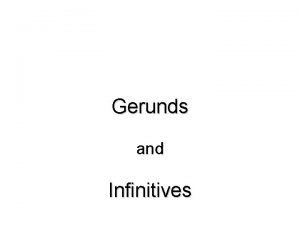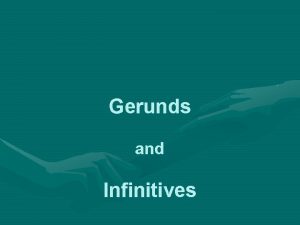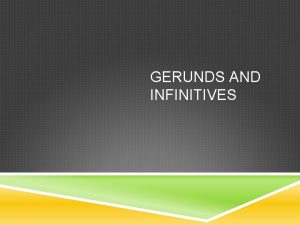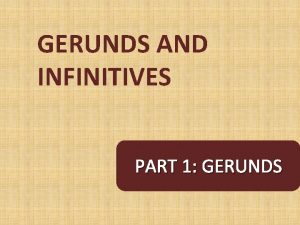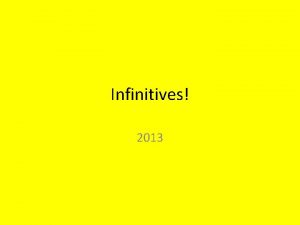GERUNDS AND INFINITIVES PART 1 GERUNDS AJ 19















- Slides: 15

GERUNDS AND INFINITIVES PART 1: GERUNDS AJ 19. 4. materiály k online hodině

Gerundium ve větě:

Gerunds and infinitives

Gerundium • Název tohoto gramatického jevu může být pro mnohé hrozivý, ale v podstatě nejde o nic složitého. Gerundium, anglicky gerund/'dʒerənd/, je slovesný tvar, který může stát na takovém místě ve větě, kde běžně bývá podstatné jméno, tedy hlavně na místě podmětu, předmětu či za předložkou. Stále se však jedná o sloveso, nikoliv o podstatné jméno (nepoužívá se před ním člen, následuje za ním přímo předmět – bez předložky, atd. ) • Tvoření gerundia je snadné: od všech sloves se tvoří pomocí koncovky ing (sitting, going, being, smelling, opening atd. ). • I když se jedná o koncovku -ing, nejde o průběhový čas, nemá s ním nic společného. Lze ho tedy vytvořit i od sloves, u kterých průběhový čas běžně nevytváříme (seeing, hearing, believing, considering a pod. ) • Záporné gerundium se tvoří přidáním záporné částice not před gerundium (not going, not seeing).

Gerundium použití • • 1) jako podmět věty Skiing is fun. – skiing zde slouží jako podmět věty, není to podstatné jméno, ale gerundium (lyžování) Learning English is not difficult. – learning English zde slouží jako podmět věty, English je zde předmětem slovesa (gerundia), opět to není podstatné jméno, to by se totiž muselo chovat takto: the learning of English – byl by tu člen a za ním předložka of Shopping on the Internet is becoming more and more common. – shopping (gerundium) je zde opět ve funkci podmětu věty. • • • 2) jako předmět věty I like skiing. – skiing zde slouží jako předmět věty, předmět slovesa like You have to give up smoking cigarettes. – smoking cigarettes zde slouží jako předmět slovesa give up, opět to není podstatné jméno, to by totiž vypadalo takto: the smoking of cigarettes – byl by tu člen a za ním předložka of

Gerundium použití • 3) za předložkou • I'm not interested in skiing. – skiing zde slouží jako předmět předložky in • She's crazy about listening to music. – listening to music zde slouží jako předmět předložky about • I'm looking forward to going on holiday. – to je v tomto případě předložka (těším se NA), proto za ní následuje gerundium • 4) za některými slovesy • U některých sloves se používá gerundium, u jiných zase infinitiv. Podívejme se na některá z nich: • You must avoid spending too much time in the sun. I can't stand listening to their arguments. I tried to stop him but he just carried on talking. We considered spending the whole weekend in the mountains.

GERUNDS-FORM studying playing giving swimming collecting

GERUNDS-USE 1. As the subject or object of a sentence • Collecting flowers is my hobby. • I like collecting flowers.

2. After prepositions • They are interested in studying archaeology. • They dream of becoming archaeologists. • They are crazy about discovering ancient cities. • They are tired of digging in the sand. Other expressions: good at/ bad at/ keen on/ bored with/ fed up with/ afraid of

3. After specific verbs such as: like hate dislike can’t stand mind look forward to enjoy prefer fancy feel like start stop continue Begin finish quit give up practise remember forget avoid can’t help

Examples • I enjoy watching football on TV. • I hate travelling by coach. • She started playing the guitar two years ago.

Examples • He is trying to quit smoking. • Do you remember building sandcastles when we were kids?

4. Go + ing • We’re going shopping tomorrow. Other: go shopping go swimming go fishing go skiing etc. • I go swimming twice a week.

5. be/get used to + ing • I’m used to getting up early in the morning.

• Procvič si tvoření gerundia! • Let´s practise!
 Bad verbs
Bad verbs Passive modals examples
Passive modals examples Infinitive passive form
Infinitive passive form Invariable
Invariable Songs with infinitives and gerunds
Songs with infinitives and gerunds Gerund and infinitive story
Gerund and infinitive story Jeopardy gerunds and infinitives
Jeopardy gerunds and infinitives Verb and verbal similarities
Verb and verbal similarities How to identify a gerund
How to identify a gerund What are gerunds infinitives and participles
What are gerunds infinitives and participles Have+ ing
Have+ ing Gerunds and infinitives rules
Gerunds and infinitives rules Gerund expressions
Gerund expressions Gerunds as subject
Gerunds as subject Participle and infinitive phrases
Participle and infinitive phrases Difference between object and complement
Difference between object and complement
